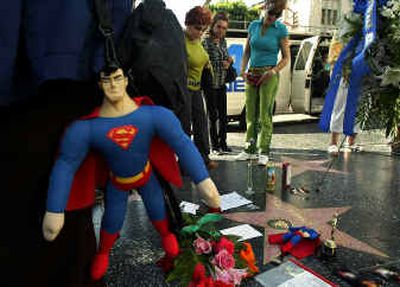Example of hope

Christopher Reeve won the public’s admiration first as the high-flying Superman and later as an activist in a wheelchair.
Yet he was equally adept behind the camera and savored directing the true story of a paraplegic girl who graduated from Harvard.
“If we can tell this one story really well about what it’s like to live with paralysis and have that seen in a dramatic form around the world, that would be a really worthwhile contribution,” he said in July.
“The Brooke Ellison Story” will premiere Oct. 25 on A&E.
But Reeve’s greatest contribution was his example of hope. He transformed the tragedy of a 1995 horse-riding accident that left him paralyzed into a personal crusade for spinal-cord research.
His death Sunday, at age 52, stunned the world because he had remained an optimistic, vital force. Reeve went into cardiac arrest Saturday at his home and died at a hospital with his family around him.
Sen. John Kerry cited the actor’s support for stem cell research in Friday’s second debate with President Bush.
“We lost a man who was truly America’s hero,” Kerry said in a statement Monday. “He met every challenge with a courage and character that broke new ground in this struggle.”
Dr. John McDonald, a Washington University neurologist who treated Reeve for five years, told CNN on Monday that he was surprised by the actor’s death.
“Chris was just an amazing individual, and I think so dedicated to his rehabilitation,” McDonald said. “As a result, he’s changed not only his life and recovery, but I think everyone else with spinal-cord injury.
“In the end, he was able to move most of his limbs and recovered sensation throughout his entire body, something that wasn’t thought to be possible.”
The Christopher Reeve Paralysis Foundation has given roughly $20,000 over the past six years to the Stepping Stone Medical Equipment Bank, which provides specialized wheelchairs to Central Florida.
“He gave a lot of our clients hope,” said Executive Director Kerra Price. “He was able to get in a wheelchair and be mobile again. He’s an inspiration to a lot of our clients to know they could regain their mobility and independence.”
Reeve discussed his rehabilitation in numerous interviews, the most notable with Barbara Walters of ABC News in 1995.
He talked frankly about his condition, acknowledging that he considered suicide after the accident at age 42. Reeve said he thought “for about 10 minutes” of giving up because living was not worth “everybody’s trouble.” Looking at his children changed his mind.
“I could see how much they needed me and wanted me and how lucky we all are and that my brain is on straight,” he said. “The thought vanished and has never come back again.”
In an interview in this month’s Reader’s Digest, Reeve said he remained optimistic about walking again.
“But I also know that, with time, I’m beginning to fight issues of aging as well as long-term paralysis,” he said. “So it seems more difficult to project than it was five years ago. But I haven’t given up.”
He said he and his wife, Dana, had grown closer since the accident. What kept him going?
“The love and support of my family, and the fact that I’m needed,” he said. “I’m working. I focus on the opportunities that come my way rather than on the things that haven’t arrived yet.”
Reeve graduated from Cornell University in 1974 and appeared as a bigamist on the soap opera “Love of Life.” On Broadway, he played Katharine Hepburn’s grandson in “A Matter of Gravity” and a crippled Vietnam veteran in “Fifth of July.” His first film was “Gray Lady Down” in 1978.
He first won wide attention later that year as the star of the big-screen epic “Superman,” in which he was equally adept as the bumbling Clark Kent and the dashing Man of Steel. Reeve continued the dual role in three sequels.
“What seemed such a nice, simple, artless performance in ‘Superman’ was the finest kind of acting,” director Sidney Lumet once said. “Reeve’s timing – and humor – has to be just about perfect to make the character come off.”
Reeve’s other memorable films included “Somewhere in Time” (1980), “Deathtrap” (1982), “The Bostonians” (1984), “Street Smart” (1987) and “The Remains of the Day” (1993).
He never received an Oscar nomination, but he made a memorable appearance at the 1996 awards and urged the industry to produce more socially relevant films.
“Hollywood needs to do more,” he said. “Let’s continue to take risks. Let’s tackle the issues. In many ways, our film community can do it better than anyone else.”
Later in his career, he found some of his best opportunities on television. He directed the HBO movie “In the Gloaming” in 1997 and appeared in an ABC remake of Alfred Hitchcock’s “Rear Window” in 1998.
Reeve also made two appearances on the WB’s “Smallville,” about the teenage Superman.
In promoting “The Brooke Ellison Story” in July, he explained how he picked work. The accident, he said, had forced him to take up directing, which he had wanted to do for years.
“I feel that in almost everything in life, whether it’s a film project or anything else, that I can really only do things I actually care about,” he told TV critics. “I just can’t take a job, because things are too difficult to do and life’s too short and too precious.
“So I’ve been very fortunate that wonderful material, like Brooke’s story, has come my way. But it’s a privilege to be able to have both a creative life, a family life, to be healthy and also to try to advocate for paralysis.”